- Home
- Robert McCammon
The Hunter from the Woods Page 7
The Hunter from the Woods Read online
Page 7
Chapter 7
"You're carrying logs," he said. "What length are they?"
"Varied lengths. Five to ten meters. Why?"
"Herr Gallatin," said the German, "we need to see Captain Beauchene. Now. " They climbed the stairs into the wounded bridge, where fog swirled in through the opening where the glass had been. A single low lantern illuminated Sofia's master, who clung to the wheel of the drifting vessel with one hand and held in the other a fresh - or nearly, since it was again half-empty - bottle of brandy.
"What the fuck do you two want?" he growled.
In Beauchene's cabin, revealed by the lantern's candle, Wesshauser leaned over the desk and on a piece of fly-specked paper drew a diagram with a fountain pen.
"Very well, I understand the torpedo part," Beauchene said as he and Michael watched the diagram take shape. "I understand about the fertilizer. " The document signed by the cargo master indicated the presence of ammonium nitrate in the black oildrums. "I understand about making a casing and a detonator and all that. . . but what are you scribbling?"
"A design," Wesshauser explained, with the candle's glow in his glasses, "to make this ship the aiming and delivery device. Look here," he said, and tapped with the pen's point. "The bow. We need a steel socket attached to the bow at the waterline. Something with clamps that can hold a ten-meter-long hardwood log. If you have saws, the log itself should be squared off from end to end and reinforced with steel on all sides to keep it rigid. Then. . . here. . . you see?"
"I'm looking, but I'm not seeing. Yet," Beauchene added.
"Here, at the far end of the log, another steel socket should be inserted. That should also have clamps to hold the torpedo steady. The torpedo will be underwater, at a depth of possibly a meter or so. You see what I've drawn?"
"A ramming device," Michael said.
"An aiming device," Wesshauser corrected. "A torpedo on the end of a steel-reinforced beam, secured to the ship's bow. With any luck, the detonator makes contact with Javelin under the waterline, and sends an electrical spark into the explosive packing. Add to the packing a payload of ball bearings, and the potential for damage to Javelin is further increased. It's going to be at best an uncertain proposition, because of the imperfect working conditions. . . but if I can find the right elements on board, I believe I can make this torpedo. "
Beauchene frowned. "There is one small problem here, sir," he said dryly. "Un peu de pas. We would have to be, as I calculate with my great brain, less than ten meters from Javelin to make this work. As you gentlemen may recall, Javelin has large fucking guns. So how, sir, do we get within ten meters of Javelin without being blown to pieces?" He finished his question with an eye-watering swig of brandy.
"We have to become the hunters," Michael spoke up, seeing the plan. "We have to seek out Javelin and go on the attack. It's the only way. "
"In this fog?" Beauchene asked. "How do we find a ship in this? And if it clears as we're charging for her, won't she just speed out of danger?"
"We have to hope the fog holds, then," said the German. "No one on Javelin will be expecting our surprise. Herr Gallatin is correct; it's the only way. "
"If they can't find us - and God, I hope they can't - then we can't find them. "
"That may not be entirely true," Michael said. "The continuous jamming signal. Can the radioman determine the direction that's coming from?"
"I have no idea. " The radioman had been released from duty for the night, and the radio shut down even as the jamming cacophony shrieked on. "Maybe he could twiddle his dials and his thumbs and make an educated guess, I don't know. "
He's a Russian, Michael thought. He remembered a saying from his life in the circus: Russians know from which way the wind blows and from which way the shit flows.
"An educated guess might do," he said.
Beauchene looked from Michael to Wesshauser and back again, searching for either sanity or hope. He took another long drink. "It'll be dawn in five hours," he told the German. "What do you need to get started?"
Twelve
Dead Ahead
Lamps hung from Sofia's bow. By their fog-dimmed glow, men worked from three lifeboats in the swells. A cable snaked down to an air-powered rivet gun, which made a tremendous racket in use. The work was charged with tension, because if a watch on Javelin heard that noise and the ship followed it, for most men dawn might never come.
A steel cage-like apparatus with a pair of claw-shaped clamps had been riveted in position just at the waterline. Now, moving ponderously and slowly, the men in the boats guided what appeared to be a ten-meter-long gray steel beam into the cage. The clamps were shut down upon it and fastened tight with wrenches. A smaller version of the cage-like device was already bolted to the far end of the squared-off log that masqueraded as a steel beam. There was a groove within the cage for a cylindrical object to be inserted and seized by the second pair of clamps.
A wooden seat descended between a pair of ropes. Dylan Custis came down with a bucket of yellow paint and a brush. He began to paint upon the bow a pair of female eyes complete with eyelashes, as below him the other men watched and waited.
Custis had approached Captain Beauchene in Michael Gallatin's presence.
You know, cap'n, Custis had said, this ship, she doan got much sense. Doan got what she needs to live, cap'n. Now if she's gone be taking a big fish in her teeth and she ain't got but the one chance, doan you think she better have some eyes to see with? Beauchene had agreed that, yes, Sofia did need a pair of eyes to see with.
I'll make 'em so pretty, Custis had promised, you'll fall in love with her all over some more.
They waited on deck for the torpedo that was being put together in a bulb-lit room where the welding torch burned bright blue and a grinding machine thinned small metal parts to nearly perfect specifications. But perfect enough? No one could say.
Michael stood on deck, watching the work at the bow with a group of other men.
Beauchene leaned over the side. There was no need to bark orders because the men knew they were fighting for their lives; perfection in this case might be an impossibility, but the work was going to be damned good enough.
Dawn was about an hour away.
Beauchene went below to find out if the shark had teeth yet.
Michael heard the girl coming. No one even looked in her direction; she was one of them by now. Marielle stood beside him, peering over the dented gunwale. When he glanced at her, she gave him a quick nervous smile and he answered with a nod. Then he noted Billy Bowers come up on her other side, and Billy also leaned over the gunwale to watch.
Michael thought that three was a crowd. He stepped back, and when he did he saw Billy silently slide his hand into hers, and she just as silently accepted it, and Michael wondered at how shipboard romances could even happen on a freighter in a sea chase. Maybe a spark had been thrown from Vulcan's forge, he thought. Falling all that way to earth it had flared with uncanny light, and drifting down upon the Sofia it illuminated a boy carrying a girl in his arms to safety. Perhaps, he thought, a future for two people could be sealed with the touch of a crippled god's fire. He hoped it was so.
As dawn began to lighten the fog, the torpedo was brought up on a handcart.
Following behind the men who pushed it forward were Captain Beauchene, Paul Wesshauser, the two engineers, the mechanics, the electrician, the pump operators, the able seamen and the ordinary seamen. The torpedo was a little over three meters in length and possibly half a meter around at its midsection. From its bullet-shaped tip protruded a trio of metal prongs. Its steel skin was mottled yellow and black, but words were written in white upon the evil-looking hide. Not just words, Michael realized in another moment, but names. Everyone who'd worked on the torpedo had written his name on it in white paint, probably waterproof, and it appeared that all the men who followed behind the handcart had added their names as well.
"Come on!" Beauc
hene told the crew on deck. "Come sign your names!" He was holding a can of white paint with a small brush resting in it, and this he set down on the handcart beside the weapon.
They came. The brush scrawled name after name, until at last Beauchene offered it to Michael.
"Sign it," he said.
It was an order.
Michael dipped the brush into the paint and found a clean place to sign. He noted the names of the wounded and dead written along the torpedo's length. He noted also a particular name: Enam Kpanga.
He wrote Michael Gallatin, and then he gave the paint can and the brush to the captain, who added the final name up near the detonator.
A portable hoist on lock-down wheels was set at the bow. Heavy cables supported the torpedo, which Michael figured probably weighed in the neighborhood of five hundred pounds. If anything went wrong lowering the torpedo over the side to the men in the boats, the dangerous fish would slide directly to the North Sea's bottom. It was going to be a tricky operation, because if that thing got out of balance and started swinging on the cables its weight could break bones and shatter the lifeboats. Also, nobody wanted the detonator to hit Sofia, though Wesshauser had already told Beauchene and Michael that it would be calculated to explode from an impact at a speed of five knots or above.
"Easy, easy!" Beauchene cautioned as a winch turned and the torpedo went down to meet the upraised arms. "Play out the cables!" he said to the hoist's operator. Then, louder: "Christ! Not so fast!"
The torpedo, still cabled to the ship, was placed across two boats and ferried over the swells to the business end of the steel-reinforced beam. Some of the men from the third boat slipped into the cold sea. Two of them wore frogmen's masks and fins, used for clearing the props and working beneath the hull. The insertion of the torpedo into its groove and the closing of the clamps to grip it would have to be done a meter underwater.
The hoist operator kept letting the cables play out to give the workers enough slack.
Then the two boats were in position. Working slowly and methodically, the crewmen manhandled the weapon into the water, where its natural inclination was to sink to the mud seven hundred meters below. The winding in of slack in the attached cables by the hoist operator prevented that disaster.
The frogmen guided the torpedo into its steel socket. Tools were passed down from the boats to tighten the clamps. When that was done and a 'success' signal shown by an upraised fist, the cables were unhooked. The torpedo stayed fixed in place in its cage and clamps, its detonator almost precisely a meter underwater.
The frogmen and the other helpers climbed back aboard the third boat. The lifeboats came back alongside and the crew, abandoning their craft to the whim of the sea, ascended on rope ladders. The cold and wet were given blankets and hot coffee.
It was a job well done, Michael thought.
Sofia was ready to be a huntress.
Paltry streams of gray light were beginning to pierce the fog. Beauchene told the crew to take their stations and be ready for action. He asked Michael to come with him to the bridge. In the wheelhouse, he rang up All Ahead Standard on the engine telegraph. The ship began to move through the waves, gradually gaining speed. In the radio room, the Russian was listening to the jamming signal and according to the slight changes in volume trying to triangulate a position of origin.
Michael saw nothing ahead but fog and sea.
"Port, thirty degrees," the radioman called. Beauchene repeated the call and made the course correction. Then, after a few minutes: "Starboard, twelve degrees. " "Starboard, twelve degrees," Beauchene called back. The wheel was turned to the right, and Michael watched the needle of the ship's binnacle-mounted compass move.
The fog remained unbroken.
Twenty minutes passed by on Michael's ancient pocketwatch. The Russian called out, "Starboard, eight degrees. "
The call was repeated, the wheel turned the rudder and the compass needle moved once more.
Sofia went on, over rolling waves into a realm of softly-floating sea clouds.
Michael felt the tension throb in the pit of his stomach. He took the revolver from his waistband, just to hold something sturdy. If the Russian miscalculated, Javelin could sight Sofia first and bring those guns to bear at pointblank range.
"Hold steady," called the Russian.
"Steady," said Beauchene. His knuckles were white on the wheel.
Salt wind blew into Michael's face through the rectangular hole where the windshield had been. In it he smelled the ship: oil, timbers, old grease-stained canvas, the burnt odor of shell damage, the rank unwashed flesh of working men and the higher, more raw scent of their fear.
He thought he was sweating under his red plaid shirt, but then he realized the wolf hairs were coming up across his back and chest. Rising up in arcs and swirls and strange patterns like primeval symbols unknown to any modern man, and then falling back again beneath the itchy human skin. He had a compelling urge to either run or pee, and he was reminded after all this time that he'd felt the exact same way after he'd killed Octavius Zloy. In that instance, he'd left a puddle of piss as he was caught between worlds and squatting on the floor.
There was nowhere to run, and he didn't think the captain would enjoy watching him stain the boards.
"Yuri!" Beauchene called. "Do you have a distance?"
"Impossible to be exact, sir. "
"Then don't be exact, just give me your best estimate. "
A silence followed, during which the Russian must have been either listening or calculating. "I'd say. . . six hundred, seven hundred meters. That's my best. "
"Straight ahead?"
"Yes, sir. "
Beauchene said to Michael, "Take the wheel. " When Michael had it, Beauchene rang up the command to the engine room: All Ahead Flank.
Sofia drove forward, her torpedo thrust out like an iron fist.
"Move aside," the captain told Michael as he returned to the helm.
But before the transfer could be made there was a shout toward the stern. Another voice rose up, unintelligible but urgent. Beauchene peered into the fog along the torpedo's path, his eyes narrowed. Michael kept the wheel steady. The thrum of laboring engines pulsed along Sofia's length. Down on the portside deck, someone shouted: "Ship! Dead ahead!"
They were upon it before Michael could pull in another breath.
It was not there and then suddenly it was. Beauchene gave a strangled cry of alarm. Javelin was crossing their bow at a slight angle toward them. Michael saw some of the enemy crewmen at a rail amidships, pointing at Sofia. The deck guns, which must have been constantly manned, began to swivel toward the freighter.
But it was going to be too late.
One of the guns got off a shot that blistered paint along the port side of the wheelhouse. And then Beauchene was standing beside Michael and wrenching the wheel to starboard before Javelin could slide past. Michael saw the torpedo strike Javelin just forward of amidships on the starboard side.
A deadly pair of seconds passed.
Then came the blast.
The forge of Vulcan blazed along Javelin's hull. A huge geyser of white water rose up and spread out, and with it the ear-splitting noise of rending steel, multiple thunders and runaway locomotives smashing together. The shockwave came back upon Sofia and hit her against her prow like Neptune's gigantic shoulder. The entire ship was shoved backward, waves smacking against the hull with the hollow booms of heavy artillery. Beauchene went to the floorboards as Michael clung to the wheel. Sofia rose up and pitched downward. Part of the geyser fell upon her deck with enough power to knock men senseless but make them think they were drowning first. Water slammed down on the wheelhouse's roof. The whipsaw motion of the wheel nearly broke Michael's wrists as he hung tight, but Sofia's next rise and fall and pitch to starboard jarred him loose and he staggered back and fell as the wheel spun to its own direction.
There was a secon
dary explosion from Javelin. A hot wind shredded the fog. Burning things flew through the air and landed on Sofia's deck. Michael struggled up in time to see Javelin's length crash against Sofia, starboard to port, in what might have been a dance of death.
For then all Hell opened.
A white-hot fireball exploded seemingly from beneath Javelin's forward deck. Funnels, flaming rope, parts of bodies and a cannon barrel were blown into the sky. The planking blazed with a violet glow as if from a gas flame. Suddenly the entire forward part of the ship convulsed with a shriek of steel. Bright red and purple objects trailing wakes of sizzling fire began to burst upward through the deck, throwing flame to all sides. They hissed upward into the red-lit fog.
Michael knew. "A spark's hit the ammo! The incendiary shells are cooking off!"
Beauchene leaped to the engine telegraph and frantically rang for Back Emergency.
As the fireballs shot upward from the doomed Javelin and spread voracious flames over the wheelhouse and deck, a massive wall of gray smoke erupted from the warship and rolled across Sofia. In it, burning men desperately scrambled over the gunwales from one ship to the other. Some of them had guns, were firing and were quickly shot by Sofia's armed crewmen, but others vanished into the murk. Huge flames were shooting up from Javelin. There were screams and pleas for mercy. As Sofia's engines began to back the ship off from the conflagration, the gap between the vessels widened and more burning men threw themselves into the sea.
Michael watched, his face drawn and tired. The reflection of flame writhed in his eyes.
He thought, grimly, that the sharks today would not have to search very long for good pieces of meat.
Javelin was leaning over on the starboard side. She was afire from stem to stern.
Almost out of sheer damned spite, she shot three more incendiaries at Sofia that sizzled over the ship and hit the choppy sea, and then the freighter backed off into the fog.
Thirteen
A Good Day's Work
Nearing nightfall, Sofia was a hospital ship without a doctor.
Beauchene had guided his girl back into the smoke and fire to rescue survivors. They'd pulled from the sea fourteen badly burned men and six more who could at least walk. The sharks were indeed already returning to the sea what had walked on land. There was no sign of Manson Konnig's body. It was going to be a long trip, the rest of the way to England, and there would surely be more canvas shrouds lowered over the side. For some of those burned scarecrows, it would be the merciful thing.
Eight Javelin crewmen were found hiding aboard Sofia, one of them in the closet of the second of V. Vivian's unused staterooms. Another was hiding down a ventilation funnel. A third had to be shot because he attacked Olaf Thorgrimsen with a pocketknife.
Sofia was a mess. With the crumpled bow that had crossed her eyes, she could barely make four knots. Multiple leaks forward had been contained and the pumps were at work, but she was badly injured. Rough weather, Beauchene told Michael at a meeting in the mess hall, could bring the sea rushing in through the patches and now they had not a single lifeboat. Javelin's heat had scorched the portside of Sofia's superstructure and blackened her gunwales. The torpedo's detonation had burst the eardrums and the resultant shockwave had broken the bones of more than one man. Every porthole on the ship had been either blown inward or cracked.
One thing could be said for Paul Wesshauser, in Beauchene's opinion. The skinny bastard knew how to pack a long dick.
Michael suggested the fans ought to be turned on in the fertilizer hold.
Beauchene and Michael took a walk around the singed deck near seven o'clock. The captain carried his Thompson and Michael his revolver, because two hours ago another Javelin crewman had been found curled up under a tarpaulin. Most of Sofia's lamps that still worked had been turned on. The crew was being fed and food was being prepared for the wounded prisoners, who'd been put into one of the forward holds. A dependable Pole had been named first mate and was manning the helm. A radio SOS had gone out and received a reply, and Sofia was meeting with the British freighter Arthurian for medical help and supplies around ten. Then the Russian, a good day's work done, went to eat his dinner and get some sleep.
Sofia's smashed nose headed west. Above the sea, stars filled the sky.
"She's not pretty but she's tough," Beauchene told Michael as they walked. "I think we'll make it all the way. If we have a calm sea. And if those patches hold. Ah, maybe we can get better equipment from your British friends, eh?" He didn't wait for an answer. "Come on, mon ami," he said, and he reached up to clap Michael on the shoulder. "I've got another bottle. "
They climbed the scorched stairs to the wheelhouse, Michael following the captain. A few low lamps burned on the bridge. The first thing the two men saw was that the wheel was unmanned and Sofia was just beginning to drift off-course. The second thing was that the dependable Pole lay on the boards on his face with blood on the back of his sandy-haired head.
The third thing they saw was a ragged and burned figure standing in the corridor.
It still had a red goatee. The ebony boots were not now so glossy.
It also held a Luger, and it fired that weapon twice.
Gustave Beauchene cried out and clutched at his left side. He fell to his knees as the Luger trained upon Michael Gallatin.
Michael had no time to draw his own weapon. He propelled himself forward as the Luger barked and a bullet whistled past his left ear.
He hit the ruins of Manson Konnig in the midsection with his shoulder and drove the man back even as he grasped and held the gun hand. The Luger fired again, the bullet thunking into the ceiling. Konnig suddenly showed his strength and tremendous power of will by striking Michael a hard blow between the eyes with his free fist and then swinging him bodily around as his knees buckled. Michael crashed through the door onto the dirty carpet of Beauchene's cabin.
Dazed, Michael saw the gun rise up again and flung himself aside as a bullet dug splinters from Beauchene's desk. He got his own weapon out and fired a shot, which went wild over Konnig's right shoulder. Konnig stood in the doorway, his teeth bared in the dark and melted face, and fired once more as Michael crawled under the protection of the desk. Then Michael lifted the entire desk up and heaved it at Konnig, who retreated into the corridor as papers flew about him and dirty plates clattered against the opposite wall.
A bolt was pulled back.
Konnig's head swivelled to the right.
Gustave Beauchene, blood blotching his shirt at left side and left shoulder, was aiming his submachine gun. He had a crooked grin on his gray face.
"I've come," he gasped, "to remove the garbage. "
He opened fire.
Michael saw the bullets start at Konnig's belly and stitch upward along the chest and into the face. Konnig danced a dead man's jig. A chunk of his head vanished in a red spray. The Luger fired once more from the nerveless fingers, the slug going into the floor.
Beauchene kept firing to the end of the clip, and then Konnig crumpled like a rag doll that had been held over a campfire by a bad little boy.
Konnig's body twitched and twisted, but without much of a head there was not much of a brain therefore he was strictly yesterday's news.
He was red all over.
The body was still. Beauchene lowered his Thompson, clutched at his wounded side again and then he too dropped. Michael emerged from the cabin and went directly to the captain's aid. He tore the shirt open to look at the wounds. Three crewmen alerted by the noise of gunfire, among them Dylan Custis, came rushing into the wheelhouse and gathered around Michael and the captain.
"For Christ's sake," Beauchene asked them, "what's the fucking fuss?" He blinked heavily, struggling to focus. "Haven't you ever seen a man who needs a drink?"
p
It was a sunny morning when Sofia made harbor in Dover. The lines were thrown and secured, the anchor was dropped, and the ugliest
ship that had ever crossed under the view of Dover Castle was safe. The gangplank went down, and the journey was done.
Several black trucks and ambulances were waiting, as well as two polished black sedans. Another crew came on to unload the cargo. The cranes moved and the hoists rattled. Blinking in the English sun, the men walked off Sofia carrying their duffel bags and strode off along the pier either alone or in groups: Olaf Thorgrimsen, soon to be bound back to Norway on another ship, and Dylan Custis, eager to visit his wife in Croydon; the engineers, electricians, mechanics, carpenter and welder; the able seamen and the ordinary seamen; the men of many nations but now the rather proud owners of one citizenship.
The freighter trash.
Marielle Wesshauser and her family had been met by some men she knew must be important. One of them was very tall and boyish-looking, though he was probably in his late forties. He had silvery-blonde hair and pale blue eyes. He had a high forehead, so he must be smart. Freckles were scattered across his cheeks and the bridge of his crooked nose. He talked quietly to her father and kept eye-contact. He seemed very cool and collected. She'd seen that same man speaking to Captain Beauchene on deck not long ago, and he'd spoken that very same way. Afterward, he and Captain Beauchene had shaken hands and then Marielle had watched the Frenchman wander around the ship. It seemed he was touching everything he could, as if saying goodbye to someone he'd once loved.
But she understood now that one had to look ahead. Always ahead. And that one had to keep working at life. Working at it, all the time. Working and working, like Vulcan at his forge.
For how else would anything beautiful be created?
They were leaving now, she and her family. The important men wanted to put them in one of the black sedans and take them to a hotel in London. That would be very much fun, Marielle thought. It would be very exciting, to walk around in London.
But first. . .
She searched and searched. Then she searched some more.
She looked everywhere.
But the gentleman was gone.
"Come on, Marielle! It's time!" said her father, who offered her his hand as usual to negotiate any precarious path, such as the gangplank.
But she decided she didn't need his hand today. Today she felt the sun on her face, and today she felt so light.
Because Billy was standing at the bottom, waiting for her, and when he saw her he smiled and came up to meet her halfway.
The
Wolf
and the
Eagle
One
"Buckle up, Major. "
The major was already buckled up.
"Short flight today, sir. "
"If you say so," said Michael Gallatin, who occupied the rear seat of the RAF Westland Lysander aircraft. He was wearing his khaki British Western Desert Force uniform, sun-bleached and dusty, consisting of a sweat-damp short-sleeved shirt, shorts, gray knee-socks and tan-colored ankle boots. Around his neck and into his collar was tucked a dark blue scarf. It was meant to keep out the chafing grit that could lead to not only great mental distress but to serious infection, particularly if the flies got their diggers in the wound. His officer's cap was the same color as the Libyan wasteland, the hue of the endless sand and the countless stones. Crammed into the space under his boots was his kitbag. It held a change of clothes, his canteen, his shaving accoutrements and his dependable American Colt . 45 automatic. He wore his insignia of rank at a slight angle, which did him no good with superior officers but earned the silent approval of those below; in any case, the superior officers had been informed to leave him alone by the letter he carried from a very important man in London.
"Weather's fine for flyin' this mornin', sir," said the young Cockney pilot, whose sidelong grin displayed his crooked front teeth. He was enjoying an obvious moment of mirth concerning his rather nervous passenger. "No reason to worry. "
"Who's worried?" Michael fired back, a little too quickly. In the North African desert in mid-August a clear sky could never be called upon to lift the spirits. It might be cloudless but it was often a pale milky color more white than blue, as if that cruel sun had burned all the beauty even out of Heaven. "You just tend to the flying," Michael said, and told himself to relax. Easier told than done. He didn't relish flying very much; it was a combination of his distrust - one should not call it fear, of course - of confinement and heights, and the whole idea of sitting in a sputtering machine many thousands of feet above the earth seemed even more unnatural to him than a sea voyage.

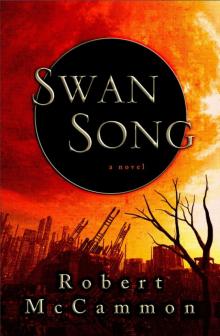 Swan Song
Swan Song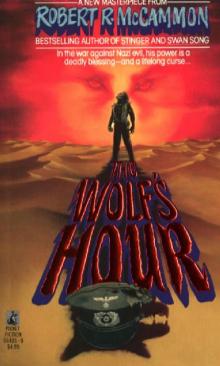 The Wolfs Hour
The Wolfs Hour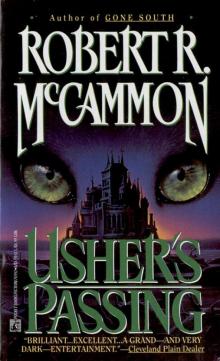 Ushers Passing
Ushers Passing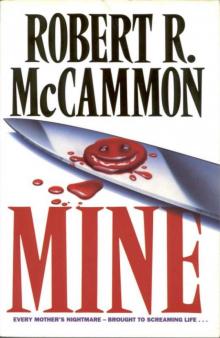 Mine
Mine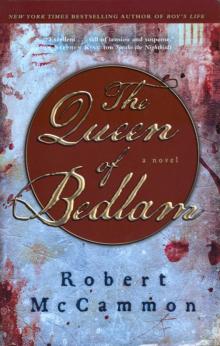 The Queen of Bedlam
The Queen of Bedlam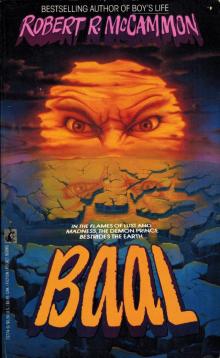 Baal
Baal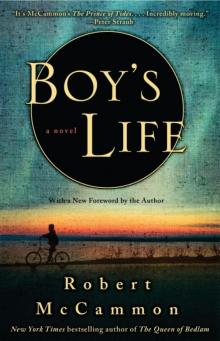 Boys Life
Boys Life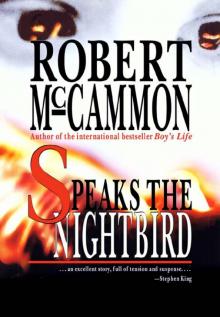 Speaks the Nightbird
Speaks the Nightbird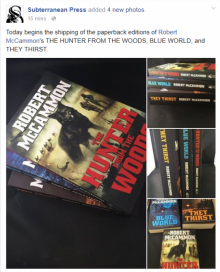 The Hunter from the Woods
The Hunter from the Woods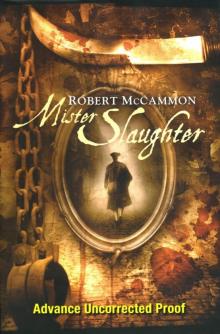 Mister Slaughter
Mister Slaughter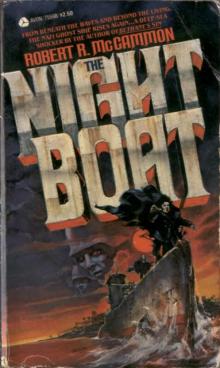 The Night Boat
The Night Boat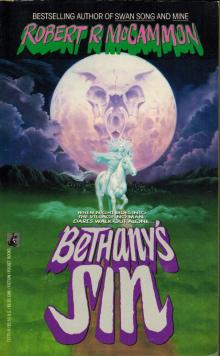 Bethanys Sin
Bethanys Sin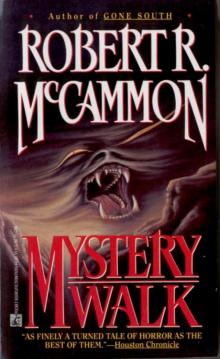 Mystery Walk
Mystery Walk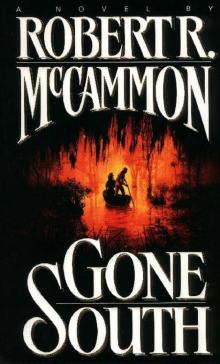 Gone South
Gone South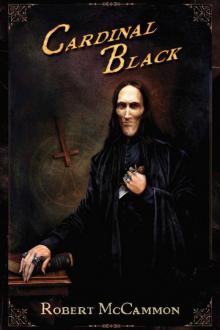 Cardinal Black
Cardinal Black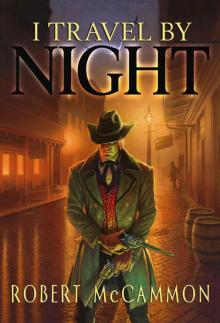 I Travel by Night
I Travel by Night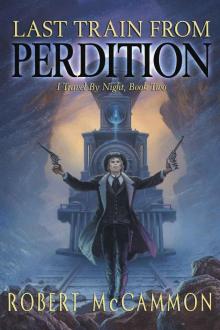 Last Train from Perdition
Last Train from Perdition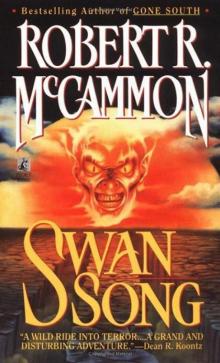 1987 - Swan Song v4
1987 - Swan Song v4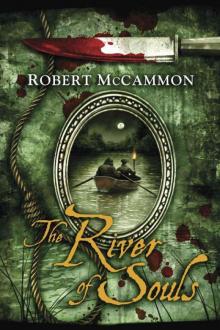 The River of Souls
The River of Souls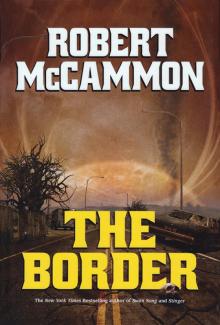 The Border
The Border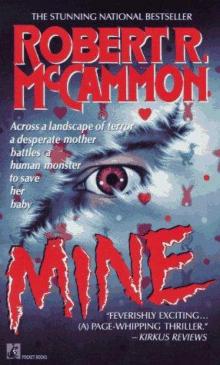 1990 - Mine v4
1990 - Mine v4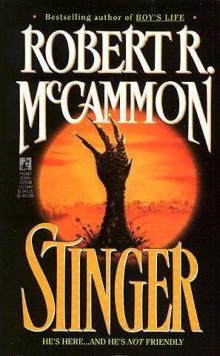 1988 - Stinger
1988 - Stinger The Listener
The Listener